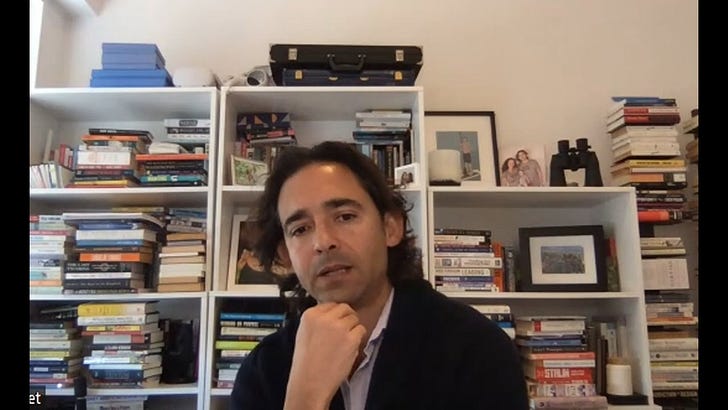You can listen to the conversation on: Spotify, Apple, at anchor, and via RSS.
Hi everyone,
I am a big fan Marc Rubinstein and his Net Interest substack and was very excited to finally record a conversation with him. Marc previously covered financials and fintech as a research analyst and hedge fund investor and now shares his takes on the sector with his readers on a weekly basis. It’s a very well written and insightful lens on a fascinating corner of the market.
I spent the first couple of years of my career as an analyst at Macquarie Group dealing with financials - with leasing and lending companies which we acquired for my employer’s balance sheet. My view has been shaped by this early period of bargain hunting and I later struggled with fintech companies and their valuations. As Marc explains, financials are a unique sector with its own rules and heuristics where growth can be treacherous and the balance sheet is of supreme importance.
It can be especially tricky to tell apart secular change from the credit cycle. As Jim Chanos said last week on Odd Lots, “every down cycle since ‘98 has seen those companies blow up, because it turns out they didn't have a better mousetrap. They just had the credit cycle at their back.”
Marc and I talked about banks, fintech, the importance of incentives and culture, payments, the need to watch regulators, private equity and how alternative asset managers have been picking up business from investment banks, and the danger of relying on the view of CEOs too far removed from the risk.
I’m going to share a few of my favorite writings by Marc followed by show notes. I hope you enjoy the conversation.
Disclaimer: I write and podcast for entertainment purposes only. This commentary reflects a personal opinion, is not investment advice, and should not be relied on to make investment decisions. The views reflected in this commentary are subject to change at any time without notice. Do your own work and seek your own financial, tax, and legal advice before making any investment decisions.
For a start, there’s something exclusive about them. There are some industries on which everyone has a view. Supermarkets for example, or consumer tech. Financials isn’t one of those industries…
Second, financials are everywhere. Even companies that on the face of it aren’t, can be financial companies in disguise.
The third aspect of financials that makes them especially compelling is they’re a great metaphor for the world around us. The financial system operates as a complex adaptive system. It consists of a network of banks and other financial institutions each of which operate according to their own incentives.
Dotcom 2.0 (online brokers, asset managers, Silicon Valley Bank):
I actually remember where I was the day the dot-com bubble burst. It was March 2000 and I was sitting in a newly-opened branch of Starbucks near my home in London, reading a copy of the Financial Times. …
Commodities trading. In commodity trading, there are three ways to make money:
Geographic arbitrage. Unlike financial markets, where pricing relationships are normally stable across regions, proximity to a product in the physical trading world can have a big impact on pricing. Commodity trading firms can leverage logistical capabilities to source product in one location and deliver in another, taking advantage of pricing differences between the two.
Product arbitrage. Pricing differences exist between different blends, grades or types of the same commodity. There are over 160 tradable crude oil products with many different refined products and numerous end-users with highly specific requirements. By changing the form of the commodity, traders can lock in a profit.
Time arbitrage. Over the long term, supply and demand tend to find a balance but, on shorter term horizons, they can remain out of sync. Trading firms can take advantage by storing commodities when supply is unusually high and drawing down inventories when demand is unusually high.
What Sort of a Business is Investment Banking?
For investment banks, risk management is their business. If they take risk, match risk and source risk, they can’t outsource the management of that to a chief risk officer; it’s the job of the frontline staff. How that all hangs together – how the incentives of staff are reconciled with the health of the firm comes down to the culture of the firm. And culture takes a long time to build, longer than most participants in fast-moving markets have the energy to invest.
Financial companies have a tradition of courting disaster, and Buffett’s names are no exception
This is not by Marc but a related idea worth keeping in the back of our head: Aswath Damodaran recently discussed how in countries with sustained high inflation “every company becomes a financial service company, because they discover it's easier to run a bank on the side and lend money out short term than it is to build factories or toll roads.”
Show notes
Marc’s experience during the dotcom crash, when being a stock analyst “was kind of the coolest job you could have”
“These cycles are a feature of history, financial services companies sit at the heart of that. One way of thinking about a financial company is like a platform that is an intermediary. It intermediates supply and demand. But because incentives are such that the financial services company makes more money through volume, be that credit volume, be that trading volume, they're incentivized to create additional supply.”
Institutions adapting to the last down cycle:
(Druckenmiller talked about this at the Ira Sohn conference.)
[11] “That's a really good heuristic. Regulators and all market participants have a tendency to fight the last battle. They'll create a framework which will make the last battle less likely, but such is the nature of markets problems will emerge elsewhere. Looking at financials you can see that. 2000, 2001, 2002, we saw a corporate credit downturn triggered by fallen angels in credit markets and a number of banks, JP Morgan being one, suffered materially from corporate credit losses. The banks that suffered the most in that cycle, rough rule of thumb, suffered the least in the financial crisis. JP Morgan outperformed in that crisis.”
Parallels to the 1994 bond market massacre:
[14] “One precedent for what's going on in markets right now, really sharp hikes in interest rates, was February 1994 when Allen Greenspan hiked rates. It was a complete surprise to the markets and brokers, dealers, and banks weren't able to position for it. It's a reason why the Fed, highly topical, is very anxious not to deliver surprises".”
The growth conundrum:
[17] “I'm not a fan of growth. Any finance analyst is rightly wary of growth. Growth can be very, very cheaply manufactured, you're giving away money. What's more important than the volume of that is the pricing. And you don't have visibility on the pricing of that until further down the line.”
Hidden financials:
[25] “I talk about various reasons why financials are interesting. One of them is that many companies are financials in disguise. There's the famous Enron conference call back in 2001, Jeff Skilling calls the analyst an asshole for asking, he says, ‘you're the only financial institution that doesn't publish its balance sheets.’ And the focal point of that in the market is oh, wow. Jeff Skilling called the analyst names. To me it’s, hang on a sec, no one actually realized that Enron was a financial company.”
GE Capital, growth, and private equity:
[31] “The yardstick for success at GE parent company was EPS growth. And GE Capital was a huge contributor towards that. Growth at a financial services company is not the way to track it. The model hasn't gone away, it's gone into private hands. Apollo is trying to recreate GE capital in its own terms.”
“They've filled a vacuum that was left when investment banks … they're not as powerful anymore. Private equity is a small part of what they do, the alternative managers, they now fill that vacuum … and they do a lot of the activities that investment banks historically used to do.”
Measuring success and competition:
“Like all sectors, you're looking ultimately for a return on invested capital that exceeds a certain hurdle rate, that reflects a willingness to return capital to shareholders.”
[36] “Competition is really damaging in financial services marketplace. Unlike antitrust policy makers, financial regulators don't promote competition. Some of the most successful banking systems globally, from a regulator’s perspective, that have not suffered a financial crisis, have been some of the most concentrated banking systems. Canada is a very good example. In Ireland today, there are only two banks as a response to the financial crisis.”
“When looking at risk at banks and in financial services, you are looking for banks that aren't trying to over compete.”
Looking at financials as an investor:
[40] “One of the reasons why I think the finance sector is so attractive is that you have all the characteristics in there. There's growth, there is value, here's momentum. All kind of factors that apply elsewhere apply within financial services.”
“It's not a complex sector and we haven't talked about that yet, but something worth mentioning is that complexity is a feature to run away from.”
“There's no intellectual property, there is a commodity component really to it. Therefore banks often layer on complexity. Run away from that.”
“Look first and foremost at the balance sheet. Understand the balance sheet. Because of that it's helps to be quite close to credit markets.”
[45] “We had a global mandate and I think that's hugely powerful to be able to see patterns across borders. Banks and financials are quite local because they are regulated on a local basis. The products themselves culturally tend to be quite local. A mortgage in the US is nothing like a mortgage in Germany. The products are quite different, but market cycles and human behavior and competitive dynamics being the same, seeing patterns across countries is hugely powerful.”
“The lesson from China with Alipay is that when non-bank, financials get to a certain size, regulators will come in. Another tool of the financial analyst is to stay close, to watch what regulators are doing hugely. That’s hugely important.”
Payments
[53] “Historically payments were almost a byproduct of banking. Banking was deposit taking fundamentally and because the liquidity sat at the bank, banks offered payments mechanisms. Increasingly, we're seeing that turned on its head and payments is becoming kind of the X of the relationship because of the data it throws off and the frequency.”
Fintech and customer engagement;
Robin hood is that actually
[54] “One of the reasons why I'm a bit cautious on business models like Robinhood is that to do finance well, engagement is a negative. You don't want your customer, objectively an investor, shouldn't be looking two hours a day on their portfolio. And yet they're incentivized to, to create that. There's a massive misalignment here between good investment practice and what these companies are aligned to do.”
“The problem with insurtech, a lot of insurance companies went public in 2020-2021, and they've performed very badly because it's a product customers only buy once a year. The inverse happens. There's no way really to create engagement. Payments is the sweet spot payments. There is a frequency of use that's not in conflict with good practice from the consumer's perspective. Companies offering payments are able to pick up data and that's hugely powerful when it then comes to credit underwriting.”
Which CEOs does he follow closely?
[59] “Jamie Dimon is very good. He's been around for a long time. Blackstone, whether it's Schwartzman or John Gray. Very insightful. And Marc Rowan at Apollo has a great understanding of financial services.”
The concept of the L6:
“I'm halfway through Michael Lewis's book on the pandemic, Premonition. I wasn't going to because in my view any book written about the pandemic was too soon. But I saw him being interviewed and it was pretty compelling.
He makes this really interesting point about what he calls L6, stands for level six in an organization. He says, if you want to understand anything, then go six levels down in an organization. At that level you'll find the person who understands what it is you're looking at. And he said it was true in finance in particular … So I think a lot of CEOs don't necessarily know what's going on.”
















Share this post